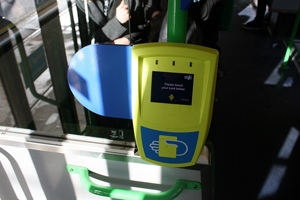Visa wants in on Oz transport smart cards

Australian governments implementing smart card systems for public transport must include contactless payment methods in their roll-out, according to Visa's ANZ general manager Chris Clark.

A Myki terminal in Melbourne (Melbourne IMG_9440 by Beau Giles, CC2.0)
Contactless payments, such as the payWave application developed by Visa, work by swiping a radio-frequency contactless reader with a card or device that has an electronic chip embedded in it which will then deduct a payment from an account. Visa's payWave technology allows for transactions of up to $100 to be conducted within three seconds. Clark said this would be ideal for public transport payments.
"Public transit ticketing is one of the more exciting applications of contactless technology. In Australia we don't have a big history of this. New South Wales, Victoria, Queensland and Auckland in New Zealand are all at various stages of implementing smart card ticketing systems at the moment and contactless payment technology, in our view, must ultimately be included in the long term eventual roll-out of these systems for the benefit of domestic consumers," Clark said at FST Media's Future of Banking and Financial Services conference in Sydney this morning.
The history of implementing public transport smart cards in Australia has seen mixed results. The first attempt to implement a smart card for public transport in NSW failed in 2008 and has since led to long-running legal troubles for the State Government. In Victoria, the Myki smart card system is up and running on trains, buses and trams in Melbourne, but has also had its fair share of troubles. Queensland has experienced less troubles with its go card system. Perth has also managed to implement a smart card system.
South Australia and the Australian Capital Territory are in the midst of roll-outs.
Clark said Visa was currently conducting a trial in New York's transit system with a payWave app on the iPhone. The app utilises a chip included in a skin covering the iPhone to interact with the terminal. Clark said the company plans to eventually have the technology embedded in mobile phones themselves, as opposed to in a skin, but there are a number of hurdles to overcome before that is possible.
"We are very dependent on three very large industries to converge — there's the mobile network operators, there's the handset manufacturers and the banking industry," he said. "We're always asked what the time frame is around genuine full roll-out of mobile payments but, to be frank, the industry has been talking about this being the next big thing for the next few years but nothing has ever tangibly been delivered.
"In the same way cameras are standard in almost every single mobile you buy, we foresee that the payment applications will also become standard in the handset," he said.
When questioned as to whether the telcos or Visa would seek to bypass the banks to implement this sort of technology themselves, Clark was hesitant to respond.
"It's lucky that I don't work for a bank and I don't work for a telco," he said. "As far as Visa is concerned, it's all three of these players that will have to work together. I don't see any land grab by telcos or Visa to be getting into financial services very quickly."
"I see a lot of people from Telstra here today. I'm sure they'd be very happy to stand up and answer that."
Commonwealth Bank of Australia and National Australia Bank are both in the middle of contactless card roll-outs.
Clark said that contactless cards were also being rolled out by Australia and New Zealand Banking Group and Macquarie Bank and said that companies such as Boost Juice, 7/11, Bunnings and Gloria Jean's were all looking into implementing payWave technology in their stores.
Also at the Financial Services Technology conference this week, St George Bank said that mobile payments were doing the load of 40 branches, National Australia Bank and Bankwest debated over the Agile software development methodology and Bankwest CIO Andy Weir spoke about innovating in banks.